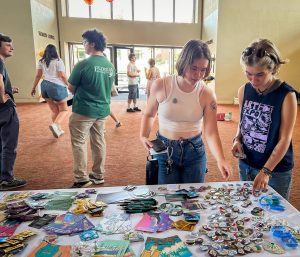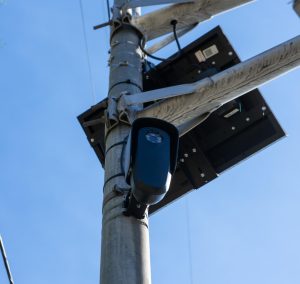As COVID-19 cases across Washington fall, Whitman begins to open up campus after three weeks of no new cases
March 18, 2021
Despite a trio of more transmittable new variants, COVID-19 infections are trending downwards in Washington State and across the country. On campus, three weeks of no positive cases means that Whitman is slowly opening up more amenities to its community.
According to the Centers for Disease Control, COVID-19 infections peaked in the United States on January 8, 2021, with 314,180 new cases on that day. A little more than two months later, on March 12, the US has approximately one-fifth of its peak number of cases, with 63,007 new infections.
As of March 14, 11.3 percent of Americans are fully vaccinated and 21 percent have received at least one dose.
Washington State is behind the national vaccine rate, with 10.98 percent of people fully vaccinated as of March 10. In Walla Walla County, 14.08 percent of residents have been fully vaccinated.
The whole state is currently in phase two of Governor Jay Inslee’s “roadmap to recovery” plan and is projected to move to phase three on Monday, March 22. After the move to phase three, counties will be evaluated every three weeks and will need to remain under 200 new cases per 100,000 in a 14 day period and under five new COVID-19 hospitalizations per 100,000 per seven days. Walla Walla County is currently well below both criteria.
Phase three increases the allowed capacity for indoor venues to 50 percent of the maximum (up to 400 people) and sports venues will be able to fill 25 percent of seats. More details will be released by the governor’s office next week.
On March 13, Whitman loosened restrictions to the fullest extent currently allowed under phase two in Washington State. The increased numbers in which Whitman students are allowed to gather as of March 5 are in line with Washington’s phase two maximums, according to Peter Harvey, chair of Whitman’s COVID-19 Task Force. Students can now gather outdoors in groups of up to 15 from two households and indoors in groups of five people from two households.
Climbing center outreach coordinator Maamoon Saleh, ’21, said that he is excited for a safe reopening of the climbing gym. He told The Wire that safety measures at the climbing gym allow students to have fun without being too preoccupied with COVID-19.
“As long as things are safe, we can keep things open and there’s not that thing in the back of your head saying, ‘does everyone know we’re supposed to be six feet apart; does everyone know you’re only supposed to climb certain routes; and is everyone else in that cautious atmosphere that plagues people’s minds,’” Saleh said. “You can alleviate that burden a little bit if the institution does a better job of implementing these [COVID-19 safety] practices.”
Whitman has its own threshold level system, like Washington State. The college has remained at level two all semester, although changes have been made to allow activities within the level. In addition to allowing students to meet in larger groups, the climbing gym, the Baker Ferguson Fitness Center and the outdoor tennis courts were opened at limited capacity.
“While we saw positive signs like zero positive COVID cases on campus for the week, we did see cases of a non-COVID virus with similar symptoms spreading on campus, highlighting that transmission of illnesses continues in our community,” Harvey said in an email to The Wire. “There are also a lot of unknowns when it comes to virus variants that are surfacing in our state. Therefore, while we did feel like we could safely open several other facilities like the climbing wall and BFFC, we did not feel like it was the right time to adjust all facilities and activities to threshold level: low.”
Washington State is attempting to sequence about five percent of all new COVID-19 infections to monitor the spread of new virus variants. The new variants the state is monitoring originated in the United Kingdom, South Africa and Brazil. The UK and South African variants spread more easily and quickly, and the Brazilian variant contains mutations that make it harder for antibodies to recognize, according to the CDC.
As of March 10, the Washington State Health Department has identified 106 cases of infection with a variant form of COVID-19, with the UK variant being most widespread. It was announced by the Benton-Franklin Health District on March 9 that one case of the UK variant was discovered in the Tri-cities area, the first case identified in Eastern Washington.
Harvey added that there are not many differences between the current threshold level and level one.
“This is because we are still in a pandemic and until our community is vaccinated, we still face significant risk of transmission in the community,” Harvey said. “At this point, it seems most likely that the Whitman community will have access to vaccinations in the summer, meaning more significant changes to restrictions likely will not occur until Fall semester.”
The Biden administration estimates that all adult Americans will be eligible for vaccination by May 1, a few weeks before the spring semester ends on May 18.






